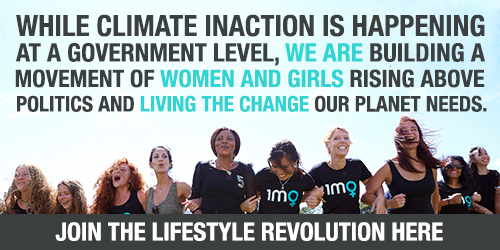Written by Eve White.
For many of us, climate change exists in an abstract realm. Something that will happen down the line to someone else. Before I had kids I worked in an area related to climate change. During this time I've sat in meetings as other scientists presented graphs of projected sea level rises and temperature rises, and talked about mitigation and adaptation. And I was concerned about it, but it never really felt personal to me until I became a mum.
Their arrival hit me with a new appreciation: this will not just affect people in other countries; it won't just affect future generations way down the track. It will impact MY beautiful kids, MY grandchildren.
This new awareness brought up all sorts of questions for me. The one that kept rising to the top was:
What does it mean to live a moral life? Is it enough just to minimise the harm we do in the world, or should we do more?
I think it is necessary to do more. I am aware that my little efforts are atoms in the ocean, but they are all that I can do. And at a personal level, taking action means that I no longer feel helpless and depressed about the situation. I find it incredibly inspiring to think that if a big enough bunch of us en masse did these seven relatively small things, we could literally change the world. So, for anyone else who might like to do just a little bit more and is wondering where to start, here's my to-do list.
1.First, inform yourself: read a bit more about the issues – or one particular aspect, e.g. coal mining in Australia, if you find the whole lot too overwhelming to contemplate. This will give you more confidence to take action.
Read more: Why is coal such a big problem?
2. Write letters to politicians, to newspapers, to companies that are operating in unethical ways (e.g., businesses using palm oil). You could aim to write one letter or email a week. This needn't be difficult – for example, take three minutes to send a quick message to Westpac congratulating them on committing to action in keeping with the below two-degree target (did you know they had announced this?), then ask when they plan to stop funding coal.
3. Ditch fossil fuels. Does your bank fund the coal industry? Is your super invested in coal? There are a couple of excellent websites that make it really easy to find out: take a look at Market Forces and Super Switch. Switch banks, change your super fund and let your old bank and super fund know why you are ditching them. Divestment may not have a massive impact on share prices (since there will always be another willing buyer), but if enough of us do it, more companies will get the message that putting money in coal is no longer socially acceptable.
Read more: is your bank or super fund bankrolling the fossil fuel industry?
4. Donate to one of the many amazing activist groups working to combat climate change.
5. If you go to a rally or write to a politician, can you think of two friends or family members might be persuaded to do the same? Personally invite them (not a group Facebook invite) to attend the rally with you – make it a social occasion. Imagine how big a rally might be if we all did this! If you are writing to a politician, share your own letter on social media, inviting others to copy and paste bits to help compose their own (I have seen this done a bit lately).
6. Participate in a local group with a focus on sustainability, such as the Transition Towns movement, a local climate action group or a community garden. Either Google or your local council can help you find one.
7. Alternatively, focus on the various groups that you already belong to: your workplace, school, sports club… Think what might happen if just one or two people from every organisation in Australia took action to change things within their organisation! An inspiring group of women that I know took action to make their kids' school fair as "low carbon" as possible, then got funding to create a website to guide others who want to do the same thing.The possibilities are endless, and could be as small as organising a compost bucket for your staff tearoom or as large as working towards carbon neutral accreditation for your organisation, or initiating a community-owned wind farm. By initiating changes within groups, outside of your own home, the benefits are likely to multiply: others may be influenced to make small changes towards a more sustainable lifestyle. Never underestimate the power of peer pressure.
To quote Bill McKibben: "Climate change is the single biggest thing that humans have ever done on this planet. The one thing that needs to be bigger is our movement to stop it." This is up to you and me. There is a massive grassroots movement afoot and, for the sake of our children and all the children of the world, as many of us as possible need to be part of it.
We'd love to hear about how you got started on your climate journey, and what you would suggest to those just beginning. Let us know in the comments section below.
Eve White lives in southern Tasmania. She is a full time mum and part time freelance editor with a professional background in ecology. Banner image: Shutterstock
Read this next: We're all trying to buy happiness, but is that what we really need?

